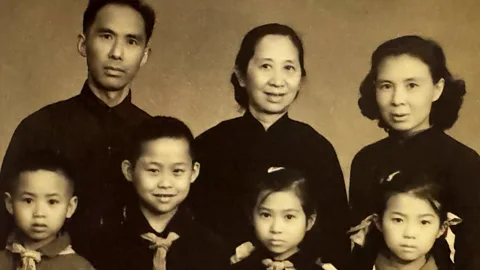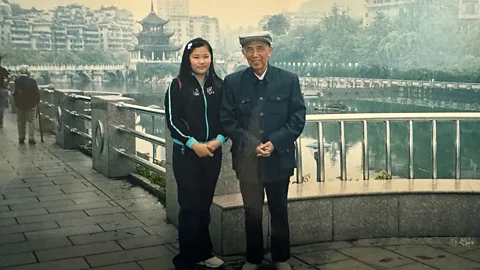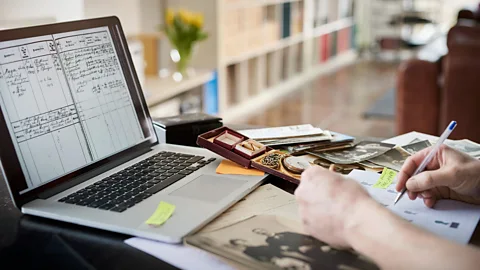'It can be life-changing': How exploring ancestry helps mental health
 Katherine Wang
Katherine WangLearning about ancestry can boost mental health and act as a powerful tool in helping heal generational trauma.
I often think about my grandfather. Born in 1915 in the Chinese countryside to a family of poor farmers, he was the first in the village to go to university. He barely survived being a political prisoner in brutal concentration camps – a punishment for being a journalist speaking against the nationalist Kuomintang (KMT), the government in power at the time. He survived a world war, a civil war and a cultural revolution that divided a nation and persecuted educated people such as himself. Yet despite all these hurdles, he went on to live a long and fulfilling life.
Reflecting on his story reminds me how different my life would be if my grandfather hadn't defied his father and gone off to university. As well as how different it would be, if his daughter (my mother) hadn't also defied her father's wishes, and left China in 1989 to study a master's degree in the UK.
I feel incredibly grateful and proud when I think about how brave they were to take their respective leaps. Their bravery has afforded me educational opportunities that some of my extended family, still living in that small village in rural China, could have only dreamt of growing up.
Nor am I unique in valuing this sense of connection to the choices of those who've come before me. In today's fast-paced world, many of us feel disconnected – not only from others but from ourselves. Yet research suggests that engaging with our ancestry can have profound psychological benefits: helping individuals to thrive by building emotional resilience, inspiring personal growth and disrupting cycles of generational trauma.
 Katherine Wang
Katherine WangWhether driven by curiosity or uncovering challenging truths, discovering our heritage can allow us to put our own experiences into perspective. It can remind us that even negative emotions can be reframed into empowering narratives of resilience, becoming a powerful tool to heal trauma and prevent history repeating itself down later generations.
A source of strength
According to Susan Moore, an emeritus professor of psychology at Swinburne University of Technology, family stories about overcoming adversity can be "empowering" when they are passed down to new generations.
Her research on ancestry and well-being finds that exploring our family history can offer significant psychological benefits. "Young people, children and teenagers who know more about their family history have higher levels of satisfaction and wellbeing," she says.
The Science of Happiness
You can find out more about the benefits of thinking about our ancestors in this episode of The Science of Happiness on BBC Sounds, executive-produced by Shuka Kalantari and produced by Haley Gray. Listen to more episodes of The Science of Happiness.
Moore has conducted and analysed of a survey of almost 1,000 Australian hobbyist genealogists to explore the psychosocial drivers behind researching family history. She found that engaging in ancestry research often leads to people feeling more in control of their lives and experiencing a deeper understanding of themselves and their place in the world – including gratitude for the struggles their predecessors faced on behalf of their children.
Other studies, too, show that younger people's knowledge of family history contributes to a developing sense of self. And that it can be a useful clinical indicator of psychological wellbeing and have a positive impact in clinical and educational settings.
When oral historian and cultural leader Mi'Jan Celie Tho-Biaz reflected on her great-great-grandmother Emma's journey from slavery to freedom, it became a source of strength and resilience as she navigated her own challenges after her father's passing.
Spending time communicating to ancestors, she told me, whether it was through writing, research, or meditation, helped ground her in everyday life – supporting her sense of identity and agency.
"My DNA is made of people who have defied odds, I come from people who worked to attain freedom and love," she says. "The huge stakes and odds they beat, just for me to exist... [it] makes you feel like you have superpowers."
Breaking negative cycles
Connecting with ancestry as a form of therapy can thus have tangible mental health benefits, not least since the hardships and trauma that ancestors experienced can affect later generations. Understanding that history can help break intergenerational trauma.
Moore recounts the story of a young man whose father suicided at the age of 45. Upon conversing with his grandmother, he discovered that his late grandfather had done the same at a similar age. Having had a history of depression, learning this about his family motivated him to finally seek help and start therapy.
More like this:
• Can trauma's legacy be passed down the generations?
Helen Parker-Drabble, a social historian and former counsellor, says for some people engaging with ancestry can be "absolutely life-changing" in improving mental health. She notes one individual who discovered they were not the first in their family to suffer from addiction.
"It can help them reframe their experience and let go of some of that guilt, shame, and self-hatred they had been carrying and treat themselves more kindly," she says.
Digging into one's past is not always a positive process however. "Sometimes people find out things [about their ancestors] they're not happy about," says Moore. Some discoveries, such as murder, family secrets, or betrayal of ancestors can challenge mental health. Moore's research found that around two-thirds of family historians experienced strong negative emotions like sorrow or anger through researching their ancestors; however nearly all had experienced strong positive emotions such as joy or pride.
By understanding the past in context and acknowledging sources of dysfunctionality, it is possible to rework sadness into a positive family narrative of resilience and strength, says Moore.
It is important, however, that such work is done in a supportive environment. A survey by Clive Haydon and his colleagues of 239 university students aged 18-20 revealed the positive influence of understanding family history – but also highlighted the need to facilitate the exploration process in "a context of warmth and mutual respect”.
 Getty Images
Getty ImagesIn my own case, my grandfather, Hongren Tang, passed away when I was a teenager. Separated by a continent, language and culture, I couldn't fully appreciate or understand his experiences until years later. He was around my age when he was a political prisoner, and I often wonder what I could learn from his struggles during my own times of doubt and crisis.
What advice would he have when I feel lost? I don't know the answer, but the connection I have to my ancestors has become a source of inspiration and strength during moments of uncertainty.
If you are suffering distress or despair and need support, you could speak to a health professional, or an organisation that offers support. Details of help available in many countries can be found at Befrienders Worldwide. www.befrienders.org
In the UK a list of organisations that can help is available at bbc.co.uk/actionline
--
If you liked this story, sign up for The Essential List newsletter – a handpicked selection of features, videos and can't-miss news, delivered to your inbox twice a week.
